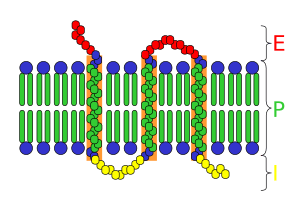Receptor (cell biology) facts for kids
A receptor is a special part found on the outside of cells. Think of it like a tiny sensor or a special lock on a cell's surface. These "locks" are made of protein molecules.
When a specific molecule, like a message or a "key," comes along and fits into the receptor, the receptor gets activated. If the right "key" isn't there, the receptor stays inactive. When a receptor is activated, it causes a change inside the cell. It's how cells receive important instructions!
Receptors on the cell surface help cells communicate with the world outside. Special messenger molecules, like hormones or neurotransmitters, attach to these receptors. This attachment sends a signal into the cell, changing how the cell works. This whole process is called signal transduction, which means the cell is getting and understanding a message.
How Receptors Are Built
A receptor has different parts. One part sticks out from the cell's outer layer, called the plasma membrane. Receptors are also found on the membranes of cell organelles inside the cell. The main job of a receptor is to recognize and react to a specific "key" molecule, like a hormone. Some receptors even react to changes in electrical signals around the cell.
The middle part of the receptor is inside the cell membrane. It can be like a tiny tunnel, called an "ion channel." When the right "key" molecule attaches to the outside part, this tunnel can open up. This lets tiny charged particles, called ions, pass through. In other cases, when electrical signals change, the receptor changes its shape. This change in shape then sends a message inside the cell.
The part of the receptor that is inside the cell interacts with the cell's inner workings. There are many different types of receptors, and each one works in its own special way to help the cell respond to its environment.
Related pages
 | Leon Lynch |
 | Milton P. Webster |
 | Ferdinand Smith |


